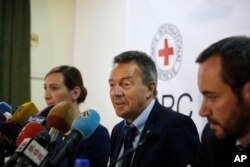The chief of the international Red Cross has made a rare visit to the front lines in Yemen, taking a dirt road on Monday to reach the besieged western of Taiz, devastated by more than two years of fighting.
The visit by Peter Maurer, the head of the International Committee of the Red Cross, is meant to provide the ICRC with a firsthand look at Yemen's raging cholera epidemic and the humanitarian disaster amid the civil war. Maurer already visited the southern port city of Aden and will be ending his trip in Sanaa.
The executive directors of UNICEF and WHO are also in Yemen to urge for much-needed humanitarian aid. The $2.1 billion humanitarian appeal for Yemen is only 33 percent funded, and the response to the cholera epidemic requires an additional $250 million, of which just $47 million has been received, according to the United Nations.
Mauer posted a video showing him driving on unpaved roads to Taiz and tweeted: "The city is encircled and main roads are cut off."
"I find this needless suffering absolutely infuriating. The world is sleep-walking into yet more tragedy," Maurer said on Sunday.
The visit is unprecedented since Taiz - once Yemen's culture center - has been split by the bitter war into zone areas controlled by the Shiite Houthi rebels and their allies, and those controlled by factions financed and armed by the Saudi-led coalition and the Yemeni government.
Hundreds of thousands of Taiz residents have been caught across fire and residents use donkeys to carry smuggled goods and basic necessities on unpaved roads in and out of the city.
The Saudi-led coalition has waged an extensive air campaign since March 2015 to dislodge the Houthis who currently control the capital, Sanaa, and much of the country's north. The conflict has pushed the already impoverished nation to the verge of famine, displaced 3 million, and killed over 10,000 civilians.
Since April, a cholera epidemic has ravaged the country with around 400,000 suspected cases and over 1,800 deaths. The rainy season underway threatens to worsen the situation and the numbers of cholera cases are expected to double by the end of the year, according to ICRC.
Maurer urged warning parties to allow in humanitarian aid. Since the beginning of the Saudi-led air campaign in 2015, the coalition imposed a blockade on Yemen's air and sea, shut down Sanaa's airport and limited access to vital sea ports.
"Further deaths can be prevented, but warring parties must ease restrictions and allow the import of medicines, food and essential supplies and they must show restraint in the way they conduct warfare," Maurer said.
The ICRC chief is also expected to discuss the issue of illegal detentions and forced disappearances. He says 10 Yemeni families reach the ICRC offices every week to report a missing person.
Hundreds of detainees are held in undisclosed locations and informal prisons across Yemen, including southern cities where the United Arab Emiratis and forces loyal to it have set up a network of secret prisons where torture is rampant.





